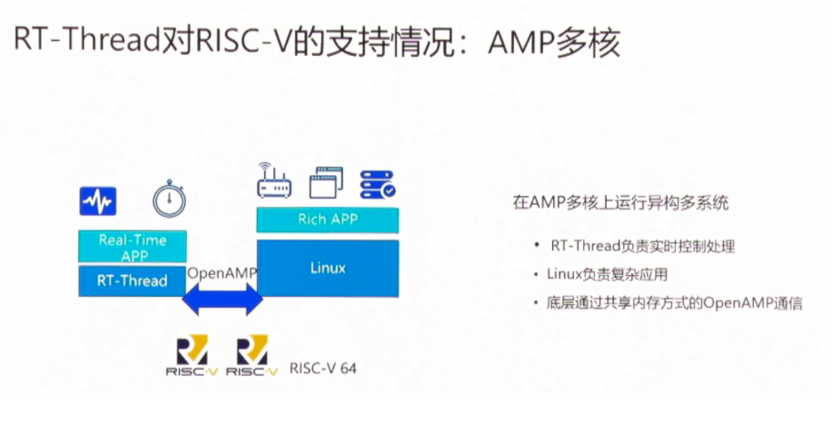The hardware alone is not enough, what is the current system support of RISC-V?
For a new architecture, the system ecology is often the most difficult piece to do well. Take Arm as an example. After Arm became the mobile overlord, it has been difficult to make progress on the desktop system. It wasn't until Apple began to launch the Arm chip Macbook that Arm's desktop ecology began to flourish. The same is true for RISC-V. If excellent system support cannot be developed, it will be difficult to become a substitute for Arm in various applications.
RT-Thread
In addition to the support of the Linux kernel and related distributions, RISC-V has also received support from many RTOS systems, such as the well-known RT-Thread system in China. RT-Thread provides strong support for RISC-V. For example, RT-Thread's IDE tool, RT-Thread Studio, provides comprehensive support for Xinlai Technology's RISC-V core.

RT-Thread's support for RISC-V heterogeneous / RT-Thread
In addition, RT-Thread also launched RT-Smart, a microkernel operating system that supports RISC-V 64-bit architecture. RT-Thread can run on some low-resource RISC-V architecture chips, supplemented by the powerful RT-Thread Ecological support. RT-Smart can run on high-performance processors such as Allwinner D1 to develop automotive electronics and industrial control.
FreeRTOS
FreeRTOS is an open source real-time operating system for MCUs that allows users to easily write, deploy, protect, connect and manage small edge devices with low power consumption. Since this open source system contains an ever-rich software library, it is also suitable for applications in all walks of life, especially for connecting low-power devices with cloud services. FreeRTOS is also the main IoT system promoted by Amazon Cloud Service AWS.

Corvette-F1 N25 / Andes Technology
Among the development kits officially certified by AWS are Andes Technology's Corvette-F1 N25 and SiFive's Learn Inventor. Corvette-F1 N25 is an FPGA-based development board compatible with Arduino. It has a built-in 60MHz 32-bit RISC-V AndesCore N25 core, provides GPIO, I2C, PWM, SPI and UART interfaces, and is equipped with a support for IEEE 802.11 b /g/n wireless module.
OpenWrt
OpenWrt is a highly modular embedded Linux system, I believe everyone has seen it in routers and smart homes. Due to its customizable capabilities, OpenWrt has become one of the mainstream router systems, but due to the different CPU core architecture, if RISC-V is not supported, many applications ported in the past will crash.
OpenWrt also provides support for SiFive's U540 SoC. U540 is a 4+1 multi-core RISC-V chip with 4 U54 RV64GC application cores and 1 E51 RV64IMAC management core. Users can run OpenWRT on SiFive's HiFive Unleashed development board.
Android
In the first half of this year, Ali Pingtou also transplanted and successfully ran Android 10 on a development board based on the Xuantie C910 core. The ICE SoC in the development board integrated three Xuantie 64-bit C910 cores and a GPU core. The chip can provide HEVC/AVC/JPEG decoding capabilities of 4K60 frames.

ICE SoC / Flathead
After all, the Android ecosystem is the most popular open source mobile ecosystem at the moment. If RISC-V can be successfully supported by Android, it will bring endless space for future development. Although there are currently many people within Google who are doing RISC-V related development work, Android does not officially support RISC-V.
ChromiumOS
Recently, the PLCT Lab team revealed in the RISC-V software developer community that they are porting ChromiumOS, which is an open source version of Google ChromeOS. ChromeOS is mainly designed for notebooks and tablets, and the main applications cover the Chrome browser, built-in media player and file management, and web applications. However, since 2016, Google has opened up the ability to run Android apps on ChromeOS devices, and even virtual machine software manufacturer Parallels has also launched Parallels Desktop for this system, which can even run Windows programs.
However, these features need to be implemented by other dependencies such as containerization. Being able to run ChromeOS does not necessarily mean that Android applications can be run.



